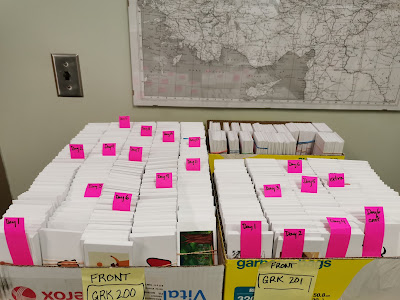On the other side is the lexical form of the Greek word along with additional information about the word:
The top line notes the chapter in which the word appears in our course textbook and identifies the word's semantic domain category (τάξις), in this case πάθος, ἦθος. The bottom line provides details about the word's grammatical form, beginning with its part of speech (μέρος λόγου), in this case ῥῆμα. Verbs are classified into their ancient Greek verbal pattern (συζυγία), e.g., βαρύτονα δ'. Principal parts are also included for about 100 verbs.
The format for nouns is similar. Here, for instance, is an ἄμαξα:
There is no English on the cards because our goal is reading fluency in Greek. Bypassing English wherever possible and avoiding the habit of mentally translating as one reads speeds up the reading (and language learning) process.
The 500 words include classroom vocabulary, common semantic domains such as animals, fruits and vegetables — θρίδαξ anyone? — as well as words that appear in the Italian version of Ἀθήναζε, our main textbook.
My colleague, Wes Olmstead, is responsible for coming up with authentic ancient Greek ways of categorizing Greek grammatical forms, for carefully tagging the grammatical information that appears on the back of the cards, and for compiling an initial list of words for our students to learn.
My job was to find useable images that suit the words, to set up the mail merge process, and to produce the finished product:
 Printing, cutting, and sorting multiple sets of 500 cards is a bit of a massive undertaking (even with the whole family involved), so I was relieved to find that — thanks to my work with Hebrew picture flashcards earlier this summer — the process of importing the Excel file and images into a digital version of the flashcards went smoothly:
Printing, cutting, and sorting multiple sets of 500 cards is a bit of a massive undertaking (even with the whole family involved), so I was relieved to find that — thanks to my work with Hebrew picture flashcards earlier this summer — the process of importing the Excel file and images into a digital version of the flashcards went smoothly:Anki's spaced-repetition flashcard app has several advantages to printed cards, not least of which is the ability to make them freely available online.
- The full set of cards is too large for Anki's free hosting service, but I have uploaded a sample, which should appear presently. Try searching for "Ancient Greek Picture Flashcards."
- The full decks, Briercrest Ἀθήναζε and Briercrest Ἀθήναζε Reversed, are hosted on my Google Drive account. You can download them here.
- See this post for more information about Anki, and basic instructions about installing and using the decks: https://gervatoshav.blogspot.com/2023/06/using-anki-to-review-biblical-hebrew.html
Production notes:
- Most of the images are from Vecteezy (with a Pro license).
- The font on the cards is GFS Neohellenic.
Comments and feedback are welcome.







7 comments:
These are amazing. It's great to see more people pushing into a Greek only type paradime. I do have a question about where the cards might sometimes be unclear to some people? I had this difficulty with BLC video as well, when I was first learning, occasionally I really could not work out what the picture on the card is communicating, and I would waste a lot of time trying to work out just exactly what the occasional image was really trying to communicate. Most of the time this is not a problem, but when the problem occurs its quite frustrating.
Thanks for your comment, Jay. Most of the images are hopefully reasonably transparent, although some will only make sense after someone learns what the word means. I left them in anyway in the hope that they will help people remember the word once they have received an explanation. I'm sure there are a few duds as well. Because a single word is printed on the other side, beginning learners can look them up in a Greek-English dictionary. Logeion is a good option: https://logeion.uchicago.edu/.
I'm very glad to see this. Excellent work, and thanks for making this available.
These are quite beautiful and helpful. If you are the Anki developer I did buy Anki version in the Apple store so hope this helps cover costs
thank you
Jeff
These are amazing! Thank you so much! I've spent the past month with them and it's been very helpful! Only possible mistake I found was νυξ- shouldn't it be feminine? Again, thanks a million.
Thanks for the correction, Joseph. νύξ should be feminine. I will make the change to the version on Google Drive.
Opus perquam iucundum.
Congratulationes.
Post a Comment